LAMFALUSSY AWARD
Along with The Lamfalussy Lectures Conference, the Magyar Nemzeti Bank also established the annual international Lamfalussy Award.
previous awardees



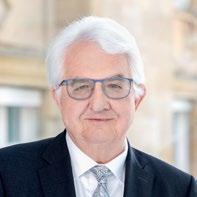
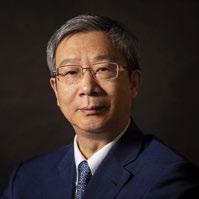

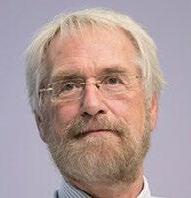
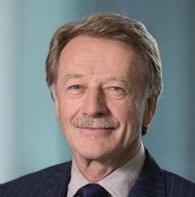 Robert Holzmann, Governor, Oesterreichische Nationalbank
Robert Holzmann, Governor, Oesterreichische Nationalbank
2022 2023 2021 2020 2019
Yi Gang, Deputy Director of the Economic Committee of the CPPCC National Committee, former Governor of the People’s Bank of China
Boris VujčiĆ, Governor of Hrvatska Narodna Banka
Peter Praet , former Member of the Executive Board of the European Central Bank
Yves Mersch, former Member of the Executive Board of the European Central Bank
previous awardees


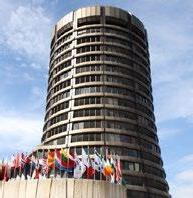

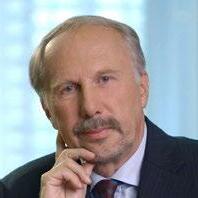


2 2017 2018 2016 2015 2014
Zhou Xiaochuan, Vice Chairman of the Boao Forum for Asia, former Governor, of the People’s Bank of China
Jacques de Larosière, former Managing Director of the International Monetary Fund former Governor of the Banque de France
BenoÎt Cœuré, President of the Autorité de la concurrence, former Member of the Executive Board of the European Central Bank
Ewald Nowotny, President of Austrian Society for European Politics, former Governor of the Oesterreichische Nationalbank Bank for International Settlements


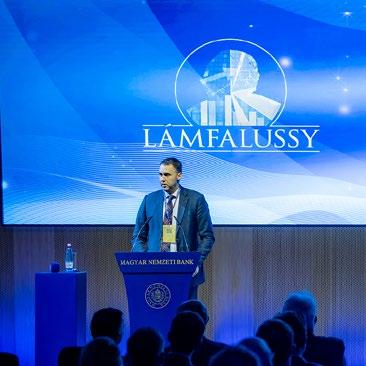


2023
COUNTRIES SPEAKERS
14 9 FROM
10 000 500 ATTENDEES ONLINE ATTENDEES PERSONALLY LAST EVENT IN NUMBERS
„Let us take the advice of professor Lamfalussy: in order to re-build Europe, first of all we need financial stability”
György Matolcsy, Governor of Magyar Nemzeti Bank
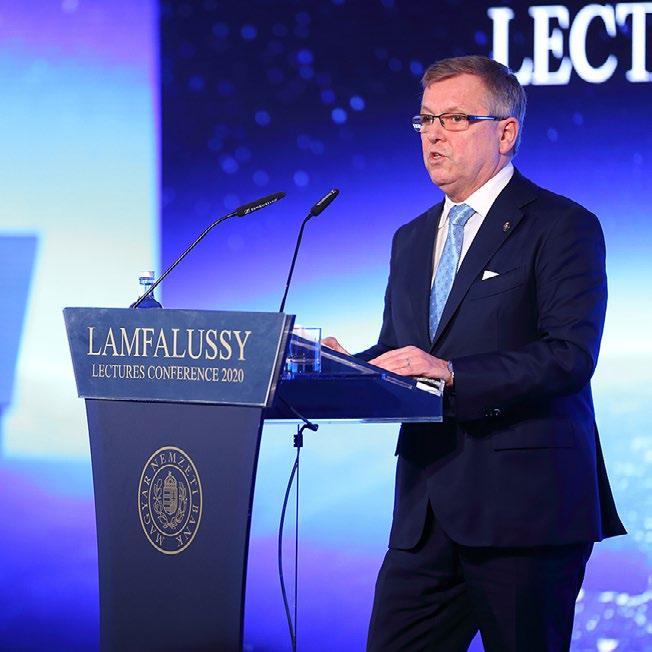
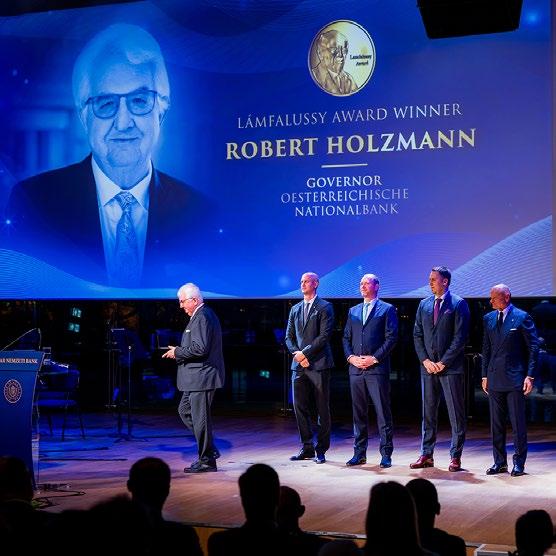







TOPICS OF THE PREVIOUS EVENTS


2023 New dimensions of central banking in the post-covid era
2021
The future of monetary policy after Covid-19 with a perspective for public debt evolution
2020 The new challenges related to sustainable convergence
2019 The process of economic catching-up, particularly within the EU and in Asia
2018 The trends and great transformations taking place within the EU and in Asia
2017
The
2016
2015
2014
The economic, monetary and financial integration of Europe, the causes of the euro crisis, monetary policy challenges, euro accession strategies and issues related to the Banking Union

 opportunities in the European-Asian economic cooperation and the centrifuge forces threatening the future of the European integration
Professor Lamfalussy commemorative conference
The changing role and objectives of central banks due to the financial crisis
opportunities in the European-Asian economic cooperation and the centrifuge forces threatening the future of the European integration
Professor Lamfalussy commemorative conference
The changing role and objectives of central banks due to the financial crisis


 „Navigating in uncharted waters”
Baron Alexandre Lamfalussy
„Navigating in uncharted waters”
Baron Alexandre Lamfalussy
LIST OF SPEAKERS IN THE PREVIOUS LÁMFALUSSY LECTURES CONFERENCES (in alphabetical order)
Edmond Alphandéry, former Minister of Economy of France, Henner Asche, Deputy Director General, Markets, Deutsche Bundesbank, Erdem Başçı, former Governor of the Central Bank of the Republic of Turkey, Morten L. Bech, Centre Head, BIS Innovation Hub Switzerland, Iain Begg,
Professor of the London School of Economics and Political Science, Agnès Bénassy-Quéré,
Professor at Centre d’Economie de la Sorbonne, Marco Buti, Head of Cabinet of European Commissioner Paolo Gentiloni, former Director-General for Economic and Financial Affairs, European Commission, Mu Changchun, Director of the Digital Currency Research Institute, The People’s Bank of China,


Serey Chea, Governor, National Bank of Cambodia, Zhimin Chen, Chair and Professor at Fundan University, Hyeonjung Choi, Director of the Center for Global Governance and Research Fellow at the Asan Institute for Policy Studies, Benoît Cœuré, President of the Autorité de la concurrence, former Member of the Executive Board of the European Central Bank, Paul De Grauwe, John Paulson Chair in European Political Economy at The London School of Economics and Political Science, Igor Dimitriev, former Director, Central Bank of the Russian Federation, Barry Eichengreen, Professor of Economics and Political Science, University of California, Berkeley, William B. English, Professor in the Practice, Yale University, Alicia García-Herrero, Senir Fellow, Bruegel, Olivier Garnier, Chief Economist, Director General, Banque de France,


Sonja Gibbs, Managing Director and Head of Sustainable Finance, Institute of International Finance (IIF) Adam Glapiński, President, Narodowy Bank Polski, Daniel Gros, former Director of the Centre for European Policy Studies, Professor of Practice at Bocconi University Gábor Gyura, Sustainable finance consultant, United Nations Environment Programme Finance Initiative (UNEP FI), Denis Hew, Director, Asia-Pacific Economic Cooperation (APEC)
Policy Support Unit, Robert Holzmann, Governor of the Oesterreichische Nationalbank, Renwei Huang, Executive Dean, Fudan Institute of Belt & Road and Global Governance, Park In-Kook, President Korea Foundation for Advanced Studies, Boštjan Jazbec, former Governor of Banka Slovenije, Marius Jurgilas, Senior Vice President of Super How,


Csaba Kandrács, Deputy Governor of Magyar Nemzeti Bank, Kairat Kelimbetov,
Governor, Astana International Finance Centre (AIFC), former Governor of the National Bank of Kazakhstan, Turalay Kenç, former Deputy Governor of the Central Bank of Republic of Turkey, Hoe Ee Khor, Chief Economist, ASEAN+3 Macroeconomic Research Office, Sean Kidney, CEO, Climate Bonds Initiative, Harris Kim, Director of Inflation Research Division, Bank of Korea, Christian Kopf, Managing Director, Union Investment Privatfonds GmbH, Philip R. Lane, Member of the Executive Board of the European Central Bank, Jacques de Larosière, former Managing Director of the International Monetary Fund, former Governor of Banque de France, former President of the European Bank for Reconstruction and Development, Senior Adviser at BNP Paribas, Povilas Lastauskas, former Director of Center for Excellence in Finance and Economic Research, Bank of Lithuania, Assistant Professor, Queen Mary University of London,


Lawrence J. Lau, Ralph&Claire Landau Professsor of Economics, Lau Chor Tak Institute of Global Economics and Finance, Csaba Lentner, Professor, Ludovika University of Public Service, Shu-Pui Li, Advisor to the Governor, Central Bank of the United Arab Emirates, Erkki Liikanen, former Governor of the Bank of Finland, Cheng Lin, Director, Center for International Collaborations, Beijing Institute of Finance and Sustainability, John Lipsky, Senior Fellow, Johns Hopkins School of Advanced International Studies, former First Deputy Managing Director of the IMF, Ivo Maes, former Senior Advisor at National Bank of Belgium and Robert Triffin Chair at the Catholic University of Louvain, José Luis Malo de Molina, Director-General, Banco de Espana, Catherine L. Mann, Member of Monetary Policy Committee, Bank of England
György H Matolcsy, Governor of Magyar Nemzeti Bank, Thomas Mayer, Founding Director of Flossbach von Storch Research Institute,


Yves Mersch, former Member of the Executive Board, European Central Bank, Thammarak Moenjak, Chief Representative, Bank of Thailand, London Representative Office, Reza Moghadam, Vice Chairman of Global Capital Markets, Morgan Stanley, Petia Niederlaender, Director for Payments, Risk Monitoring and Financial Literacy, Oesterreichische Nationalbank, Erik F. Nielsen,
Group Chief Economist and Global Head of CIB Research at UniCredit Bank AG, Ewald Nowotny, former Governor of Oesterreichische Nationalbank, Christian Noyer, former Governor of Banque de France, Viktor Orbán, Prime Minister of Hungary, Dániel Palotai, Executive Director of the International Monetary Fund, Mihály Patai, Deputy Governor of Magyar Nemzeti Bank, Eduardo Pedrosa, Secretary General, Pacific Economic Cooperation Council, Luiz Awazu Pereira da Silva, Deputy General Manager of the Bank for International Settlements,



Peter Praet, former Member of the Executive Board of the European Central Bank, Klaus Regling, former Managing Director of the European Stability Mechanism, Debora Revoltella, Chief Economist and Director, European Investment Bank, Ilmars Rimsevic, former Governor of Latvijas Banka, André Sapir, Professor at Université Libre de Bruxelles, Andrew Sheng,
Distinguished Fellow of Asia Global Institute, the University of Hong Kong, former Chairman of the Securities and Futures Commission of Hong Kong, Carlos da Silva Costa, former Governor of Banco de Portugal, Jan Smets, former Governor of the National Bank of Belgium, György Szapáry, Chief Advisor to the Governor of Magyar Nemzeti Bank, former Ambassador of Hungary to the United States, Khee Giap Tan, Co-Director, Asia Competitiveness Institute, Associate Professor of Public Policy, Lee Kuan Yew School of Public Policy and Chairman, Singapore National Committee for Pacific Economic Cooperation (SINCPEC), National University of Singapore, Poul M. Thomsen, former Director of the European Department, International Monetary Fund, Niels Thygesen, Professor at the University of Copenhagen,

Guoli Tian, former Chairman of the Bank of China, Robert Triffin, Chair, Catholic University of Louvain, Sir Paul Tucker, former Deputy Governor of the Bank of England, Lúcio Vinhas de Souza, Advisor, European External Action Service, former Head of Economics Team, European Political Strategy Centre (EPSC), European Commission, Barnabás Virág,
Deputy Governor of Magyar Nemzeti Bank, Boris Vujčić, Governor of Hrvatska narodna banka, William R. White, former Chairman of the Economic and Development Review Committee, Organisation for Economic Cooperation and Development (OECD), Thomas Wieser, former President, Eurogroup Working Group and Economic and Financial Committee of the EU, Guntram B. Wolff, former Director, Bruegel, Yan Xuetong, Dean, Tsinghua University, Bin Yang, Vice President, Tsinghua University,

Li Yang, Chair, National Institution for Finance and Development, Chinese Academy of Social Sciences, Yang Yao, Dean and Professor, National School of Development, Peking University, Bernard Yeung, President of Asian Bureau of Finance and Economic Research, National University of Singapore, Gang Yi, former Governor of People’s Bank of China, Linda Zeilina, Founder and CEO, International Sustainable Finance Centre (ISFC), Xiaochuan Zhou, former Governor of People’s Bank of China


Celebrating the first 100 Years of the Central Bank of Hungary
The Lamfalussy Lectures Conference series has come to a special edition in 2024, as the Magyar Nemzeti Bank (MNB), the Central Bank of Hungary is celebrating a double anniversary: the centenary of the establishment of the independent central bank of Hungary and the tenth edition of the event.
The independent central bank, which was established to regulate and supervise financial affairs, became one of the most important institutions of national unity. Thanks to the efforts of Sándor Popovics, the first Governor of the central bank, the foundations for the economic recovery of Hungary, which the country had suffered through the First World War, were laid down during first decade of the independent central bank’s existence. The centenary is linked to three dates in particular.
On 26 April 1924, the Act establishing the MNB came into force, on 24 May the joint stock company owning the central bank held its inaugural general meeting, and on 24 June the MNB began its operations.
Throughout its history, the MNB has successfully promoted Hungarian interests. Moreover, the central bank has always played an essential role in maintaining the country’s financial and economic stability, even in challenging historical years and in situations that threatened its basic functioning.




 Magyar Nemzeti Bank, the Central Bank of Hungary
Magyar Nemzeti Bank, the Central Bank of Hungary













 Robert Holzmann, Governor, Oesterreichische Nationalbank
Robert Holzmann, Governor, Oesterreichische Nationalbank














 opportunities in the European-Asian economic cooperation and the centrifuge forces threatening the future of the European integration
Professor Lamfalussy commemorative conference
The changing role and objectives of central banks due to the financial crisis
opportunities in the European-Asian economic cooperation and the centrifuge forces threatening the future of the European integration
Professor Lamfalussy commemorative conference
The changing role and objectives of central banks due to the financial crisis

 „Navigating in uncharted waters”
Baron Alexandre Lamfalussy
„Navigating in uncharted waters”
Baron Alexandre Lamfalussy


